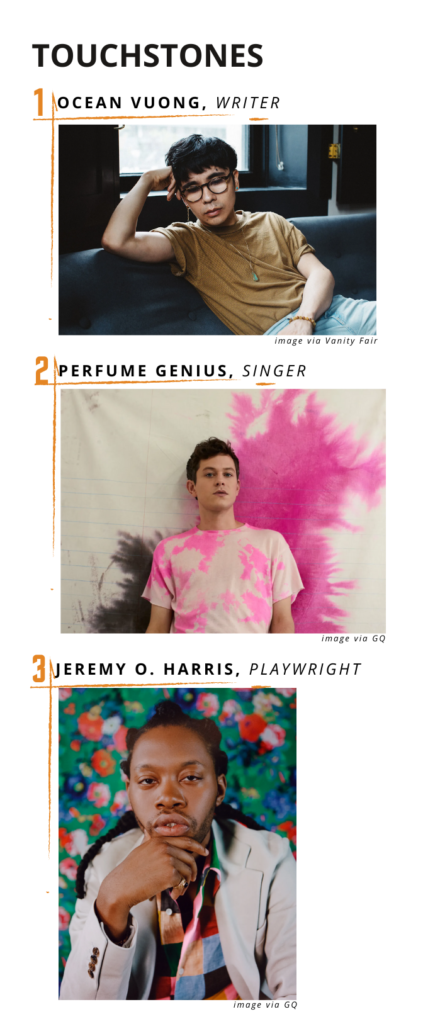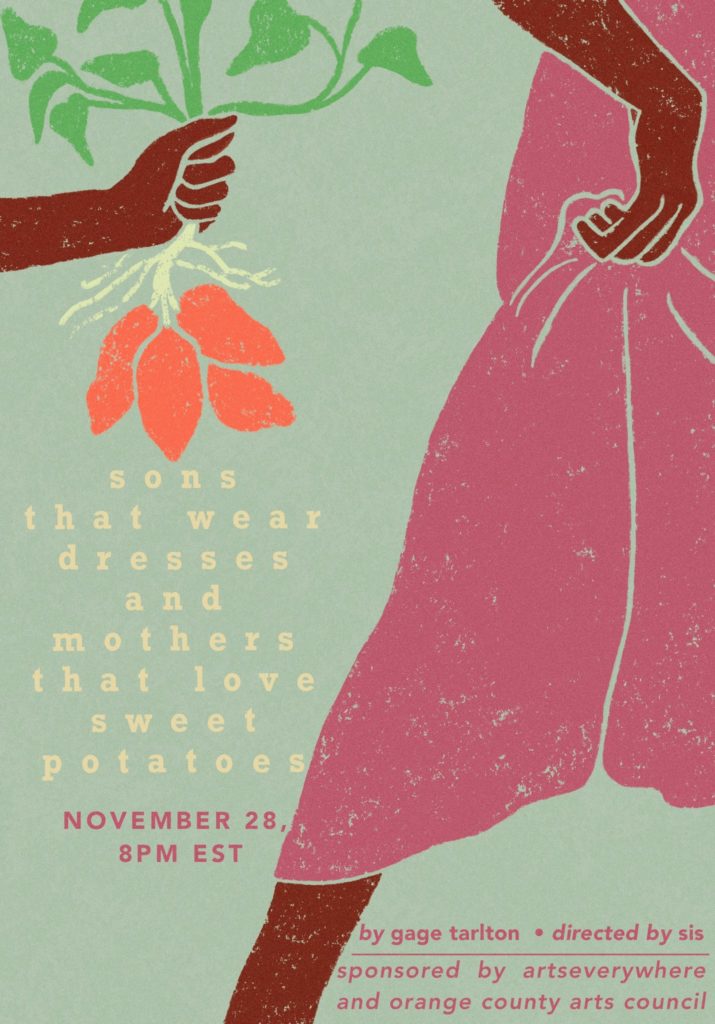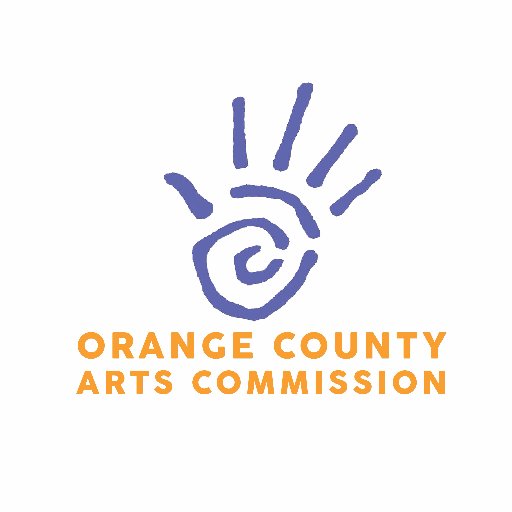Via the Orange County Arts Commission, Article by Emilie Menzel
Gage Tarlton wants you to know that the world of contemporary theater is bustling with innovation, and you should join. He’s a playwright from Chapel Hill rethinking theater accessibility, writing about intersecting Southern and queer identities, and working from a palpable love of the theater community.
The Backstory
What do you do if you’re a child drawn to the theatrical without access to a theater or drama resources? If you’re Gage growing up in Wadesboro, NC, you harness the theatrical joy that your community does have. Think studying the clown performances by Barnum and Bailey, think playing dress-up recreations of Sister Act, think movies movies movies and a resulting attention to theatrical atmospheres. You jump at the opportunity to play Young Scrooge in an 8th grade production of A Christmas Carol. You latch on to the thrill of acting. You pull your surroundings for inspiration until you swim in it like a sea. And when you finally reach college age, you head to UNC Chapel Hill to study Dramatic Arts.
Acting to Writing
The first two years of Gage’s time at UNC, he immerses himself in acting—roles in Cabaret, Chicago, The Laramie Project, and A View from the Bridge. He becomes immersed in the theater community through work study jobs with Playmakers Repertory Theater—helping with casting and creating play study guides. Through his job, he reads contemporary plays voraciously. And he’s a good actor, good enough to earn spots with prestigious programs like the Williamstown Theater Festival, which he attends the summer after his sophomore year at UNC. But it’s while acting that he begins to notice a distance between himself and the stage experience. At Williamstown, the actors spoke about acting as losing themselves onstage, finding immersion in the acting to the point that they forget where they are, they forget the time, and they are completely in engrossed in their roles. Gage, however, always found himself thinking “what’s the next line, how long should I pause,” too much in his head. Interestingly, while perhaps not good for acting, it’s this ability to observe oneself, hyper-attention to speech pacing and rhythm, and consciousness about performance delivery that make a talented playwright.
 But What to Write
But What to Write
Toward the end of Gage’s sophomore year, he had begun work on a semi-autobiographical play about queer platonic relationships. It’s the classic queer friendship story: two people meet, struggle romantically, and sometimes get lucky enough to find one another as friends instead. Though this story is common and one with which many people resonate, it’s received little representation in contemporary playwriting. Gage had come to UNC openly queer, and after taking a course with Jacqueline Lawton his Freshman year about theater as a medium of social change, he is interested in exploring how playwriting might be used to further explore social identity and enact social movement. To be southern and queer are often scoffed as contradictory identities—polar ends of persona stereotyped as the prim and the hyper-masculine. But what if we were to embrace both, and what can each identity teach the other? “I think all of my work is inspired by, or driven by, the intersection between my southerness and my queerness,” says Gage. “How can southernness also be extremely queer, and how can queerness be extremely southern? There’s so many southern queer writers, people that live in these places that are queer. They’re not hidden, they’re just not usually given a voice. And that’s where my kind of work comes in, is giving voice to those kind of people who aren’t trying to hide, they just aren’t in the spotlight because nobody’s given them the spotlight to be in.”
Additionally, Gage’s writing is interested in finding ways to let the contemporary reader into the story and the form in a way “classical” theater like that of The Bard sometimes prohibits. “Even though it’s a specific story with specific characters, what are the ways I can make it as open to as many meaning interpretations as possible,” says Gage. For him, this includes playing with form and removing punctuation. In the text of his play Sons that Wear Dresses and Mothers that Love Sweet Potatoes, he plays with line breaks the way one is accustomed to seeing in poetry. Punctuation is scarce, and for some characters non-existent. Gage explains that this is done as a way of mirroring breath and the natural pauses people take when speaking. “In contemporary plays, there’s new attention being given to the poetry of the way we speak and our dialogue in everyday conversations,” explains Gage. “These little tiny things [like awkward pauses and “um”] make our dialogue kind of poetic in this weird almost nonprofessional way.” He references how Clare Barron plays with font size in Dance Nation. “What happens when you’re not prescribed punctuation?,” Gage asks, clearly excited. “When actors are not prescribed punctuation or a prescribed a certain way to say something, there’re so many more possibilities that can come from it. There are some many more iterations of how you can interpret words and certain characters.”
Taking the Leap
And where better to workshop a play than at an acclaimed regional theater festival? Gage was able to have his play critiqued and performed through a reading at the Williamstown Festival, and he bloomed at the experience of having his words made new through the actors. The next year, UNC’s Kenan theater company put Gage’s play in their season. Gage began working more closely with playwrights as a literary associate with Playmakers, he attended the Kennedy Center MFA Playwrighting Workshop, and then Playmakers did the first reading of his play Sons that Wear Dresses and Mothers that Love Sweet Potatoes in March 2019. In Summer 2020, Gage collaborated with Sis, a fellow writer he met through the Kennedy Center, to create the Broadway virtual experiences Our Offering and A Christmas Offering. This past Winter, he broadcast a virtual reading of his play Sons that Wear Dresses, with support from the Orange County Arts Commission.
 Pandemic Theater
Pandemic Theater
It’s been a period of quick growth and constant collaboration for Gage, and that’s continued since his graduation from UNC in May 2020. “I had an expectation for what my theatrical journey would be a year ago,” says Gage, “and then this whole thing has happened, and kind of all of the steps that were originally ‘step one, step two, you have to make this step before you get here,’ all of those steps are kind of all over the place, and they’re kind of up for grabs for anyone.” While the pandemic has shaken the theater industry greatly, halting performances and cancelling job gigs, it’s also opened opportunities for connection that otherwise wouldn’t be available. “Because theater’s closed, there’s kind of no hierarchy right now,” explains Gage. “Everybody’s kind of on the same playing field. There’s people that would have originally said no to working with me on things that have actually said yes” because they don’t currently have other work obligations. For example, Gage’s collaborator Sis and her team are based in Houston. Additionally, where as theater performances are often felt as austere, high society events, virtual events allow play goers to talk to one another during the show through outlets like Twitter.
And Now
When I interviewed Gage for this article, it was the week of Thanksgiving, and he was a recent UNC graduate based in Orange County. In late December, however, Gage made an unexpected decision to move to New York City to pursue further theater opportunities. Sometimes wind directions change, and sometimes they change quickly. It’s often in an artist’s best interests to ride the current. While we’ll miss him here greatly, we wish him all the best in his journey ahead.
 Chapelboro.com has partnered with the Orange County Arts Commission to bring more arts-focused content to our readers through columns written by local people about some of the fantastic things happening in our local arts scene! Since 1985, the OCAC has worked to to promote and strengthen the artistic and cultural development of Orange County, North Carolina.
Chapelboro.com has partnered with the Orange County Arts Commission to bring more arts-focused content to our readers through columns written by local people about some of the fantastic things happening in our local arts scene! Since 1985, the OCAC has worked to to promote and strengthen the artistic and cultural development of Orange County, North Carolina.



